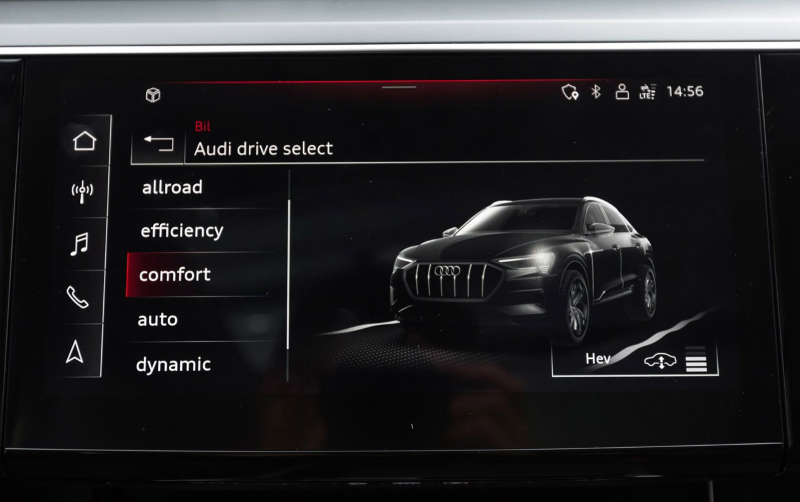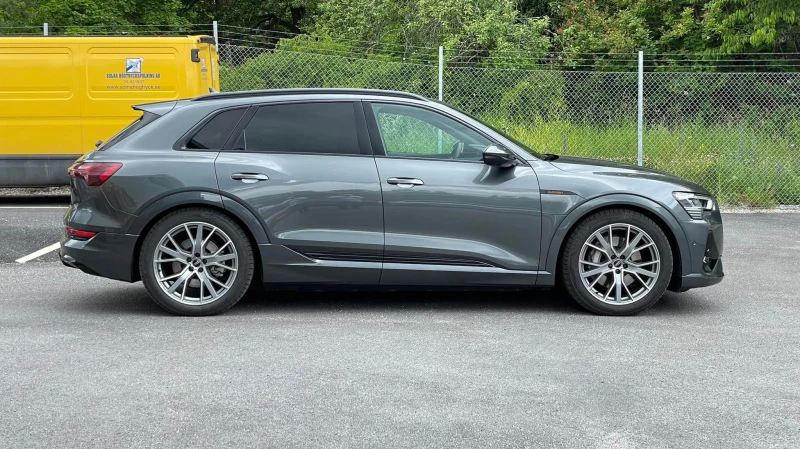Audi e-tron suspension
Audi e-tron has adaptive air supsension.
Adaptive air suspension with electronic damping control is standard equipment on the Audi e-tron. The type of damping control provided varies between the two running gear versions, adaptive air suspension and adaptive air suspension sport that is standard on e-tron S and S-Line e-tron.
The adaptive air suspension – an air suspension system with controlled damping – offers a wide range between smooth cruising and sporty handling. Depending on the speed and the driver’s preferences, it individually adjusts the ride height according to the road conditions. The air suspension also offers level control as a function of load.

Audi e-tron S with adaptive air suspension sport
The central chassis control unit, the electronic chassis platform (ECP), individually controls the function of the shock absorbers on each wheel at cycles in the order of milliseconds – according to the road surface condition, driving style and the mode the driver sets in the Audi drive select dynamic handling system. Solenoid damper valves vary the volumetric flow of the hydraulic fluid.
Adaptive Air Suspension has optionId 1BK and adaptive air suspension sport has option ID 2MB
Regulating characteristics

Audi Drive Select options adjust ride heights
The regulating characteristics (regulation of ride heights depending on vehicle speed and mode) are identical on both versions. On other Audis like Q7 and Q8 the Adaptive Sport Suspension is 1cm lower. But this is not the case on Audi e-tron.
The diagram below show how this is adjusted depending on speed.

Adjustment of adaptive air suspension in different modes
The illustration shows the control strategy for the air suspension systems. By selecting the preferred driving mode in Audi drive select, the driver determines the vehicle’s ride height and dynamic characteristics. At the same time, different ride heights are also automatically set within the selected driving mode, depending on the current vehicle speed. An example of this can be seen in the control strategy when “auto” mode is selected: If the vehicle is currently set to a different ride height, the normal level is set by changing the volume of air in the air springs if the mode is selected when the vehicle is stationary or travelling at a speed below 120 km/h.
If the vehicle subsequently exceeds a speed of 120 km/h, the ride height will immediately be lowered by 13 mm to low level 1. If the speed then increases further to at least 140 km/h and remains there for 20 seconds, the ride height will be lowered again by a further 13 mm to motorway level. If the speed is subsequently reduced again and the vehicle is driven at a speed of 110 km/h or lower for a duration of 30 seconds, the ride height is raised by 13 mm to the ride height previously set. If the speed is reduced further to 5 km/h, the vehicle is immediately raised to the original level (normal level).
Lowering the car
Even you can adjust the ride height, some want it even lower. Here are some examples on cars lowered with lowering links or software adjustment.

Lowered e-tron with 3 cm

Lowered e-tron with 3 cm

Lowered e-tron with in show mode

Lowered e-tron with 3 cm

Lowered e-tron with 3 cm
